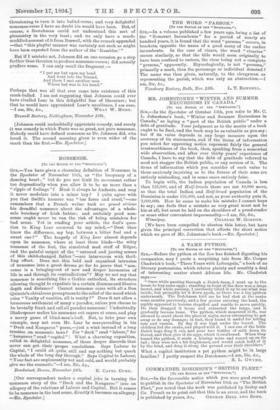NONSENSE.
[TO THE EDITOR OF THE " SFECT&TOR." J
r,—You have given a charming definition of Nonsense in the Spectator of November 10th, as "the buoyancy of a dancing heart ; " but do you not limit its movement rather too dogmatically when you allow it to be no more than a " ripple of feelings "P Must it always be Andante, and may it never modulate into a minor key ? I quite agree with you that Swift's humour was "too fierce and cruel,"—one remembers that a French writer took an grand serieux his dreadful nonsense about the advantages of a whole- sale butchery of Irish babies ; and certainly good non- sense ought ought never to run the risk of being mistaken for bad sense. Yet in reading your article, the fool's ques- tion to King Lear occurred to my mind,—" Dost thou know the difference, my boy, between a bitter fool and a sweet one P " The tragedy of King Lear almost depends "upon its nonsense, where at least three kinds—the witty nonsense of the fool, the simulated mad stuff of Edgar, and the painful output of the " untuned and jarring senses of this child-changed father "—are interwoven with thril- ling effect. Does not this bold and organised intrusion of nonsense into a great drama go far to prove that "non- sense is a bringing-out of new and deeper harmonies of life in and through its contradictions"? May we not say that nonsense is something like a Gothic cathedral, its structure allowing thought to expatiate in a certain dimness and illusive ,depth and distance? Cannot nonsense come with all a Don Quixote's chivalrous promptness to the relief of the mood which cries "Vanity of vanities, all is vanity ?" Does it not allow a humorous settlement of many a paradox, unless you choose to he brutally frank and call all paradox nonsense ! Undoubtedly 'Shakespeare makes his nonsense cut capers at sense, and play a merry game of blind-man's-buff. But, to take your own example, may not even Mr. Lear be masquerading in his "Duck and Kangaroo" poem,—just a wink instead of a long 'treatise on economic laws P For " duck " read "labour," for -" kangaroo" read "capital " ! What a charming exposition, veiled in delightful nonsense, of those deeper discords that never can get their proper resolutions. Says Labour to "I could sit quite still and say nothing but quack the whole of the long day through." Says Capital to Labour, " Your feet are unpleasantly wet and cold, and would probably :give me the roomatiz."—I am, Sir, Sec., Bradninet, Devon, November 13th. E. CAPEL CURE.
[Our correspondent makes a capital joke in turning the +nonsense story of the "Duck and the Kangaroo" into an allegory of the relations of Labour and Capital. But it ceases Ito be nonsense in the best sense, directly it becomes an allegory. Spectator.]


















































 Previous page
Previous page